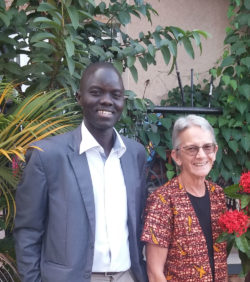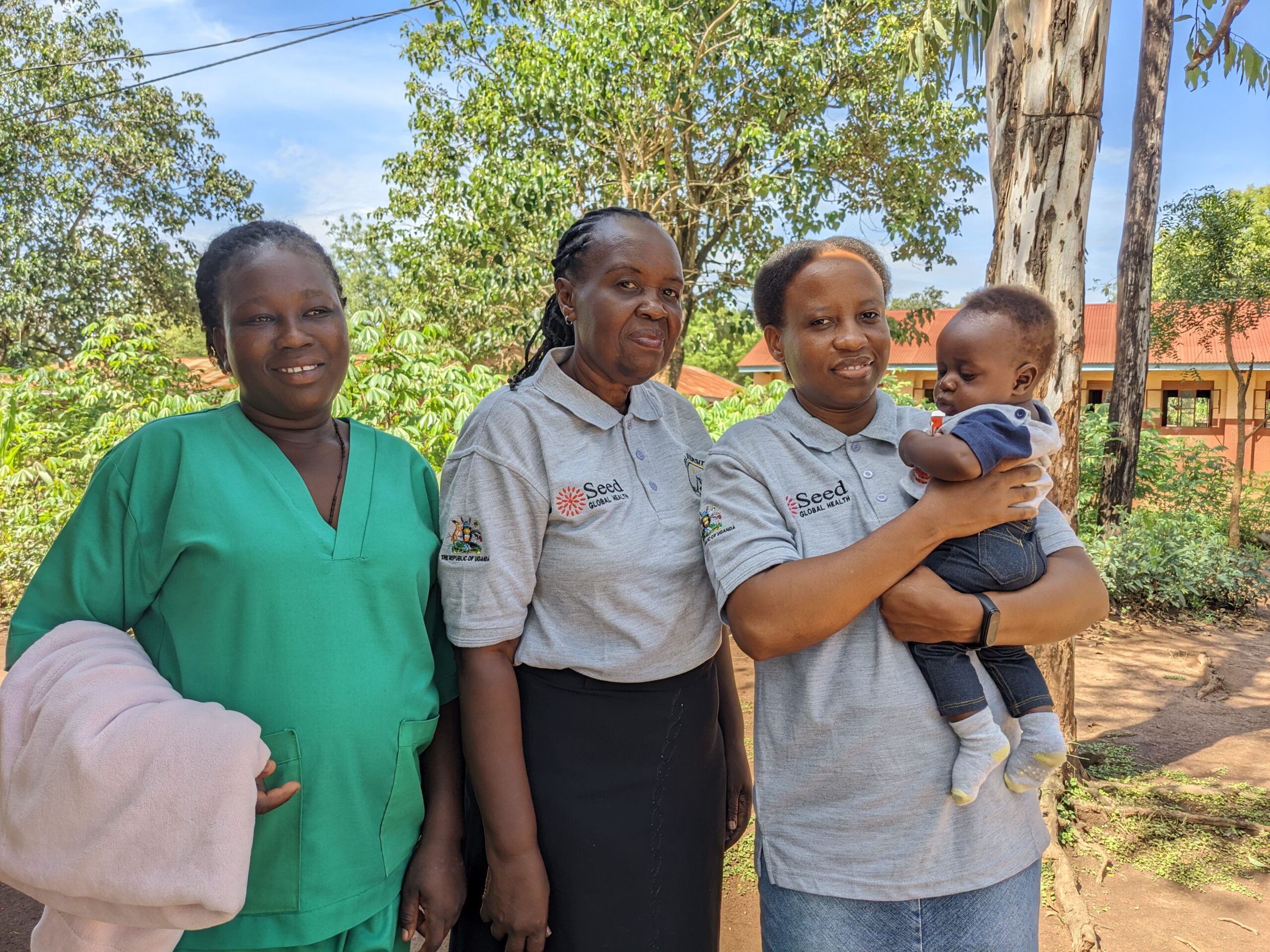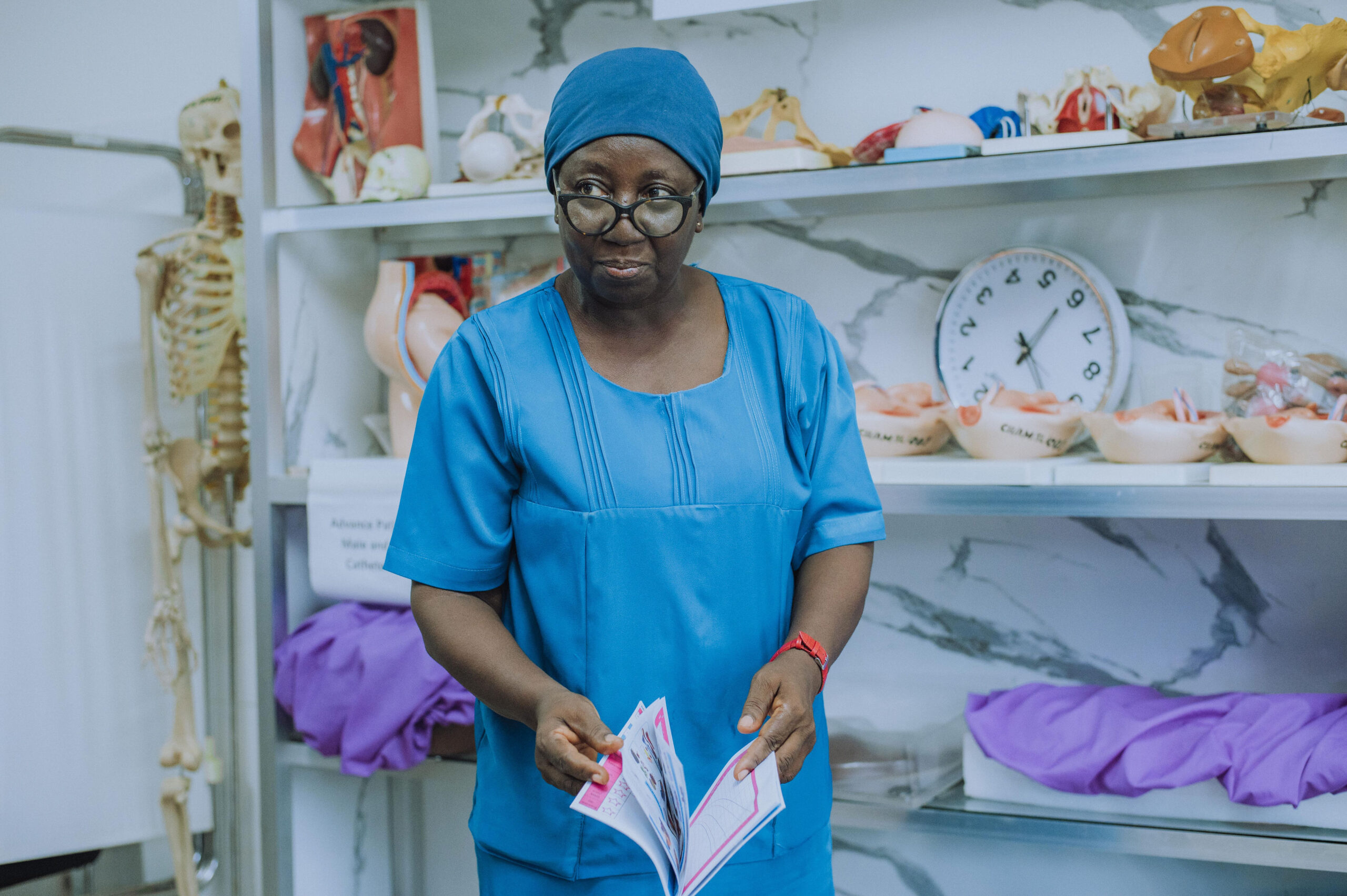Preparing the Next Generation of Nurses to Provide Quality Care
This post was authored by Amos Drasiku and Janet Gross, two nurse educators that we have had the honor of working with to strengthen nursing education in Uganda. Amos Drasiku is the Acting Head of the Department of Nursing at Muni University, Uganda. Janet Gross is currently posted as a Peace Corps Response Volunteer teaching in a Master’s in Nursing/Midwifery Education program in Liberia.
————–
International Nurses’ Day provides a great opportunity to reflect on the important role of nurses and outline ways that we can continue to support them in delivering care. This year’s theme, Nurses: A Voice to Lead Health for All, resonates with both of us as nurse educators. When it comes to nursing education, there are three things that hold true for us. Firstly, it is about preparing the next generation of nurses with the competencies needed to provide quality and safe care. It is about fostering the development of our learners’ critical thinking and clinical decision-making skills so that they can meet the needs of the populations they serve. Lastly, it is about building the leaders of tomorrow who will use their voices to advocate for the change they want to see in health systems in order to ensure health for all.
We first met at Muni University, the only public university in the West Nile region of Uganda, in August 2015. It is also the only university in the region that has a Bachelor of Nursing Science (BNS) program. Amos had been recruited as an assistant lecturer about a year earlier. He was tasked with coordinating the establishment of the program. Janet was serving as a nurse educator with the Global Health Service Partnership (GHSP), a five-year collaboration with Peace Corps, PEPFAR, and Seed Global Health. She was asked to support the development and implementation of the program.
In Uganda, especially in remote areas such as the West Nile region, nurses are often the first point of contact with—and perhaps the only access to—the health system. Given the country’s critical health worker shortages and the complexity of the health environment, with an increasing double burden of communicable and noncommunicable diseases, Muni is committed to educating and training nurses. The goal with the program was, and continues to be, ensuring that nursing graduates are well-equipped to address the complex health needs of the communities they serve.
We spent the academic year engaged in laying a strong foundation for the program and establishing partnerships with stakeholders in the community. We sought to acquire the teaching and learning resources that were required in order for the program to operate. Our collective efforts resulted in Muni meeting the minimum requirements for the BNS program which was accredited in March 2016. With a limited number of faculty, two of whom were GHSP volunteers, the pioneer cohort of students was admitted in August 2016. Although Janet moved on to another GHSP partner institution in 2016, our shared commitment to Muni’s mission remained unchanged. We continued to work as counterparts to ensure the success of the program.

Amos and Janet after a Clinical Education Model training.
Every academic year has been unique, especially for the pioneer students and the faculty. There are major challenges that they face, particularly as they prepare for their clinical educational experiences. Practicing nurses play an integral role in the preparation of the next generation of nurses, for example. However, evidence shows that preceptors lack knowledge of teaching strategies and assessment techniques needed to effectively guide students’ learning and serve as role models. There is also limited or no preparation available for clinical staff to acquire these requisite skills. Additionally, a majority of the working nurses in Uganda either have a certificate or diploma level training. In clinical education, it is preferred that the assigned preceptor be educationally trained at the same or next highest educational level as his/her trainees. Thus, it would be ideal for Muni students’ preceptors to hold a minimum of a bachelor’s degree. Lastly, given the severe shortage of practicing nurses, it is not uncommon to have one preceptor in the clinical setting responsible for more than 20 students from different institutions and over 50 patients on a ward or in the outpatient department.
To address these challenges, Amos sought to create a professional development program for local staff to adequately prepare them to be clinical preceptors for Muni nursing students. With Seed’s support, we reconnected to tackle this task. Our initial efforts started off in November 2018. We hosted a two-day workshop to develop clinical staff’s knowledge and skills so they can serve as preceptors for the students. A total of 33 individuals participated, with representatives from four different clinical training sites. Participants reported a significant increase in their knowledge and a positive change in their attitudes about clinical education after the two-day training workshop.
Although the person who elects to take on the role of a preceptor, mentor, or clinical educator may be an expert clinician, it is not uncommon for him or her to be a novice when it comes to clinical teaching. It is a skill that is learned over time and requires the support and mentorship of the educational program faculty/clinical instructor. Recognizing this, and with the success of our workshop under our belts, we put forth a proposal to continue the project. The ultimate goal was to develop a Clinical Education Model (CEM) unique to Muni’s needs. The university welcomed the idea and has continued to support the development of this CEM program.
In March 2019, with support from Seed, Janet returned to Arua. Together, we were able to further develop the CEM program for the university. The program is designed to enable practitioners to become effective members of the team and provide clinical education alongside Muni’s instructors and faculty. By so doing, they will strengthen the training of nurses and prepare them to care for their patients while addressing health challenges within their communities. Ultimately, it will result in saving lives, strengthening the country’s health system, and advancing progress toward the sustainable development goals.
At the end of our time together in April 2019, we decided that although the CEM project was done, it was not finished. Being done implied that our project had come to an end and outcomes had been met. Yet, the first cohort of Muni’s BNS program will complete their studies in May 2020 and graduate in November 2020. Until we can measure their success, we are not finished. We believe that there is always more to do when you are meeting the needs of humanity. We leave you with this quote from Dan Quayle, “We will move forward, we will move upward, and yes, we will move onward.” That is what it is going to take to achieve health for all in Uganda.
————–
Personal Acknowledgments:
From Amos Drasiku:
I am very grateful for the partnership between Muni University, Seed Global Health, and Peace Corps through the Global Health Services Partnership. The timely partnership, among other benefits, exposed us to various networks and capacity development opportunities such as the SAFRI fellowship. Being a part of the SAFRI fellowship enabled me to identify the need to prepare preceptors to be better teachers, resulting in the CEM project. I am grateful for all the GHSP volunteers who have served at Muni namely Janet, Genevieve, Casey, Karen, and Angie. Their dedicated service is part of the foundation for our nursing program. In a special way, I thank Janet for her continued service to Muni and particularly with the CEM project. We value and appreciate the diverse knowledge and experience in nursing education she has shared with us. The Seed Global Health, Peace Corps, and Global Health Services Partnership staff have been exceptionally supportive and exemplary. I am also thankful to the university’s management and staff for their collaboration.
From Janet Gross:
The opinions and views in this writing are solely the expression of myself. These views are not to be construed as representative of the views of the US Peace Corps. I am indebted to the US Peace Corps for selecting me to serve my country in the capacity of a volunteer for the past four years through the Global Health Services Partnership Program (3 years) and through Peace Corps Response (1 year). Additionally, I appreciate the support of Seed Global Health and my current supervising authority that has granted me the opportunity to use my personal leave time to provide service to Muni University.

